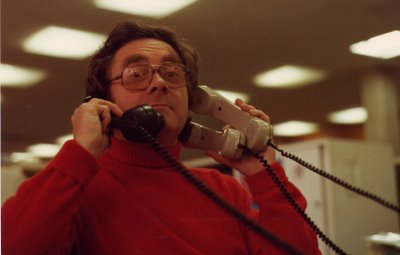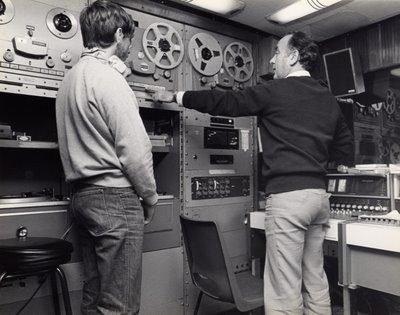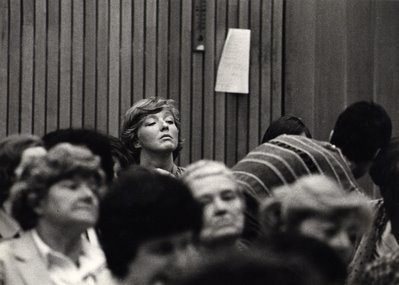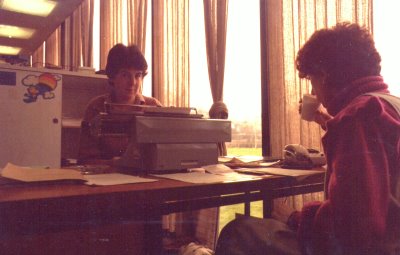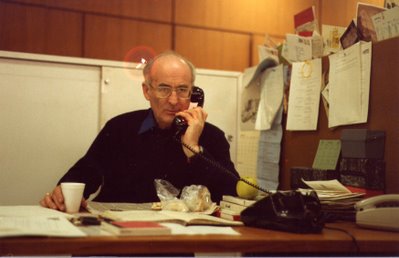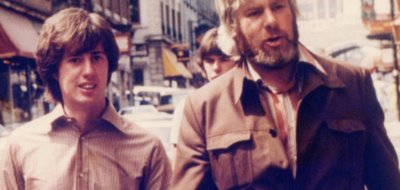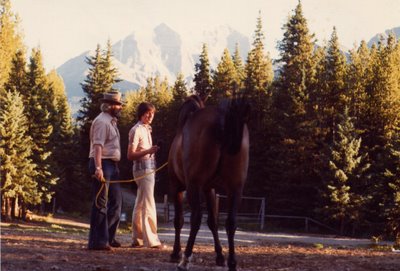 This is the very perceptive obituary that appeared in the Irish Times after Michael's death. I have only just read it (November 2006) - four years later. I wonder who the obituarist might have been? Muiris MacConghail? Ed Mulhall? Adrian Moynes? Rodney Rice? All praise to the writer.
This is the very perceptive obituary that appeared in the Irish Times after Michael's death. I have only just read it (November 2006) - four years later. I wonder who the obituarist might have been? Muiris MacConghail? Ed Mulhall? Adrian Moynes? Rodney Rice? All praise to the writer.
The piece is astute - and full of surprises, in particular his ability as a pianist and his interest in choral music. I'm shocked, even this many years on that I - of all his colleagues - never picked up on that (and, in particular, given the tracks I was eventually to follow). There was a closeness between us - and I felt a real sense of communion sitting with him in his office at the back of the Radio Centre unpicking the details of some programme or other. Kevin O'Connor used words like 'Jesuitical' or 'casuistic' about Michael, but that completely missed the point. Michael had a nose for nonsense and an instinctive moral sense, one which reminded me of my grandfather, also from Clare, a schoolteacher. I loved the man, it was a friendship that I should have tended better, and I wept the night I heard Michael had died. MICHAEL LITTLETON: He was totally committed to public service broadcasting and fiercely loyal to RTÉ and his fellow-workers.Michael Littleton, who died on August 21st aged 64, was one of the most influential and innovative broadcasters in the history of Irish radio. Much that is taken for granted in daily broadcasting is attributable to him.
He was a pioneer in general election coverage as well as in features and current affairs. For many years he produced the Thomas Davis Lectures series.During his term as head of Arts and Features, RTÉ radio documentaries won the Prix Italia two years in a row, an outstanding achievement. During 40 years' service with RTÉ radio, the positions he held included assistant head of features, magazines and current affairs department; head of features and current affairs; acting controller of programmes; and managing editor features and arts programming.
Michael Flannan Littleton was born on March 5th, 1938, the son of Michael Littleton and his wife, Bridget (née Long), of Tulla, Co Clare. He was educated locally and at St Joseph's College, Roscrea. Having studied arts at University College Dublin, he graduated in 1959.He went to work with Radio Éireann in 1961 and was appointed assistant to the general features officer, Francis McManus. Soon after his appointment, Telefís Éireann began broadcasting, and the radio and television services were joined under the banner of Radio Telefís Éireann.
There were fears that radio might lose out in terms of resources and, for a while, the radio service did become, in the words of Sean Mac Reamoinn, "the junior partner in a dual monarchy", but over time a more equal and productive relationship evolved. Michael Littleton's creativity, intelligence and wit were to the fore in the development of daytime radio, which was introduced in 1968. Until then, RTÉ closed down after the news at 9 a.m., returned for an hour-and-a-half at lunchtime and went off air again until 5 p.m.
Current affairs coverage was expanded and a regular mid-morning slot was created for Here and Now, which was presented by Liam Nolan and later by Rodney Rice. John Bowman took over the same slot with Day by Day and Pat Kenny is the current incumbent. Women Today, initially presented by Marian Finucane and then by Doireann Ní Bhríain, broke new ground, providing a platform for women and reflecting their changing role in Irish society. Elements of the programme survive today in Liveline. Today at Five, Saturday View and the Sunday Show are other programmes that originated with the support and encouragement of Michael Littleton. And two great Irish passions, religion and sport, were catered for by The Godline and Sportscall respectively.
Michael Littleton's rural origins meant that he had a good insight into another Irish passion, parish-pump politics, and this proved invaluable in the coverage of elections. With an unprecedented five general elections in the 1980s, in addition to emotionally charged referendums on abortion and divorce, he showed himself to be both sure-footed and even-handed. Likewise, the approach to coverage of Northern Ireland in the dark days of the 1970s and 1980s was a model of objectivity.
Michael Littleton did not neglect established programmes. He was responsible for maintaining the exceptionally high standards of the Thomas Davis Lectures series of which for many years he was general editor. He was a producer who valued the spoken word and he insisted on crystal-clear delivery. He did not hesitate to correct the most eminent scholars if, in his opinion, their use of language was sloppy. He also oversaw the publication in book form of each series of lectures.
He didn't see minority broadcasting as a ghetto but as an opportunity to entertain and enlighten. He sought to preserve the best traditions of the service that he entered as a young man, and ensured that there was room in the schedules for talks and discussions dealing with literature, ideas and philosophy. He saw a role for radio in supporting literary endeavour and initiated the Francis McManus Short Story Awards.
He was a respected broadcaster whose advice was frequently sought and highly valued by his colleagues. While he insisted on the highest standards from his staff, he never made unreasonable demands, and it is generally accepted that he was most agreeable to work for. He was totally committed to public service broadcasting and fiercely loyal to RTÉ and his fellow-workers. Always receptive to new ideas, he was similarly ready to nurture young talent. Documentary programme-makers in particular found him supportive. He was a mentor to many of today's leading broadcasters.
Michael Littleton was quiet and self-effacing, with a wry sense of humour. He was slow to make friends, but his friendships lasted. Musically talented, he was an above-average pianist with a particular liking for Baroque music. He was also something of an expert on the work of Johann Sebastian Bach and had a deep interest in church choral music.
He excelled at chess. He played for UCD and Collegians chess clubs and was twice Irish champion, in 1962 and 1965. He was a member of the Irish team in the 1967 European championships and represented Ireland with distinction in five chess Olympiads between 1960 and 1974. He also broadcast on chess matters. Bridge was another interest, and he kept himself in intellectual trim by solving crosswords and answering the questions in Leaving Certificate honours maths papers.
Michael Littleton is survived by his wife, Terry, brothers John and Matthew, and sisters Anne and Margaret.

 JJ Walsh, the Irish Times Chess writer, added his own tribute (11 November, 2002) and continued: "Michael had a great natural talent for the game and possibly possessed the abilities necessary to become a strong master and perhaps even reach grandmaster status but he wisely opted instead to concentrate on his successful but demanding career...."
JJ Walsh, the Irish Times Chess writer, added his own tribute (11 November, 2002) and continued: "Michael had a great natural talent for the game and possibly possessed the abilities necessary to become a strong master and perhaps even reach grandmaster status but he wisely opted instead to concentrate on his successful but demanding career...."
When eventually RTE instituted the Michael Littleton Memorial Lecture in his honour, the inaugural speaker was Mary Robinson, who introduced her lecture with a tribute: "Although a very modest and unassuming man to meet, Michael had a wide-ranging impact on the development of Radio 1. He could also be very persuasive. And I was glad to have been persuaded to give one of the Thomas Davis Lectures he organised as it gave me an insight into how committed Michael was to equality, social justice and human rights."
Nollaig O'Gadhra,himself a former FCA producer, wrote this appreciation for the Sunday Independent, published on 1 September 2002. Nollaig picks up on Michael's presentation of The World This Week, which Kieran Sheedy produced, and to which I remember listening while at university. Michael had a really good broadcasting voice, a sharp interviewing technique and I often thought it a shame that he stopped presenting. Before TWTW, Michael had produced the programme Round Table on World Affairs, Radio Eireann's first current affairs programme of any kind, presented by Kevin B Nolan. The various obits skirt around Michael's demons but Nollaig is right about the shyness. While Michael had an apparently brusque exterior, that was as far as it went.Nollaig O Gadhra on a man who had a huge influence on modern radio THE recent death of Michael Littleton marks the end of an era in RTE Radio. He was one of the most committed public service broadcasters in the land over the past four decades. A native of Tulla, Co Clare, and a graduate of University College, Dublin, Michael joined the national radio service in 1961 as a programme assistant. He worked diligently throughout the Sixties, becoming a producer mainly concerned with evening schedules and combined with Donncha O'Dulaing for the launch of the new RTE 'Round the Clock Radio' that came on air for the first time at the end of 1968.
He developed a considerable talent as a broadcaster himself, concentrating on arts and current affairs programmes that laid the foundation for the modern Radio 1 we still know today.Known by some in Montrose (though he spent over a decade in the old Henry Street location) as "the father of the current daytime schedule on RTE Radio 1", he survived the various broadcasting upheavals, conflicts and lack of clear broadcasting policies by successive Irish governments to make a remarkable contribution in the various senior editorial positions he held. He was appointed managing editor of arts and features programming in Radio 1 in 1994, and became evening and programmes and deputy editor, Radio 1 in 1998.Mr Adrian Moynes, Director-Designate of RTE Radio said Michael "was innovative, he was influential and he made an epoch in modern Irish radio."
Yet for all that, he remained relatively unknown to people, even in RTE itself. An essentially shy workhorse, a back-room boy in the best public service broadcasting tradition, he realised that radio, good radio, also required a huge dollop of common sense, commitment and fairness if it was to retain the confidence and the loyalty of the widely diverse audiences that listen to radio today.
Michael had his own prejudices and biases, his own commitments to things he believed in, and his own "pet projects" of which he was extremely proud. First was the Thomas Davis lecture series, recognised as a gem throughout the world. He also recognised the place of good, diverse and popular documentaries in any decent radio schedule and in a station which believed it advertised to broadcast, not broadcast to advertise.
He was also a devil for accuracy, correct pronunciation and an editor who believed in delegation of authority. Though not particularly committed to the use of Irish personally, he always insisted on equally high standards in a schedule which, he accepted, had to reflect the realities of our bilingual society. He always approached current affairs, and indeed political controversies, with an "overview" approach, accepting that there were usually at least three sides to all good stories that of the government, that of the opposition, and the truth which was usually somewhere in between.
One of his proudest achievements was his presentation of
The World This Week in the new radio schedules of 1968-69, when the dramatic expansion of radio not television is blamed by some for the take-off of the Northern Civil Rights Campaign. Michael was a quiet, reserved person whose only hobby was chess. He was chess mad, and could be challenged to a game at the strangest of times.
Was it his unique command of that calculating game that made him such a rock whenever there was a crisis? Perhaps.
.jpg)





